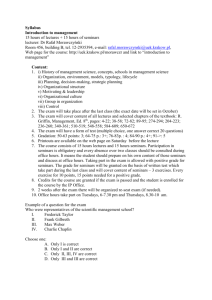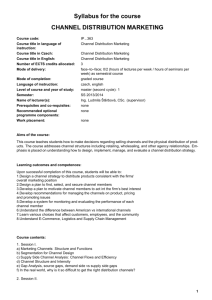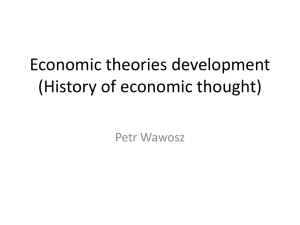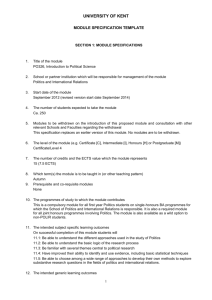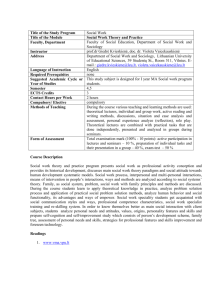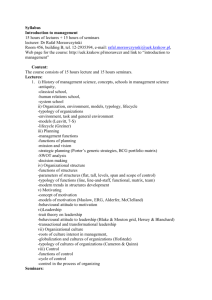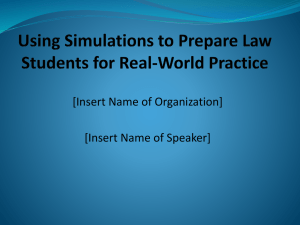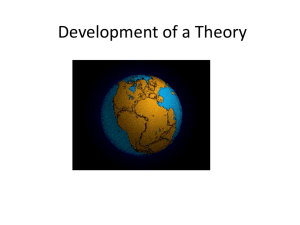section 1: module specifications
advertisement
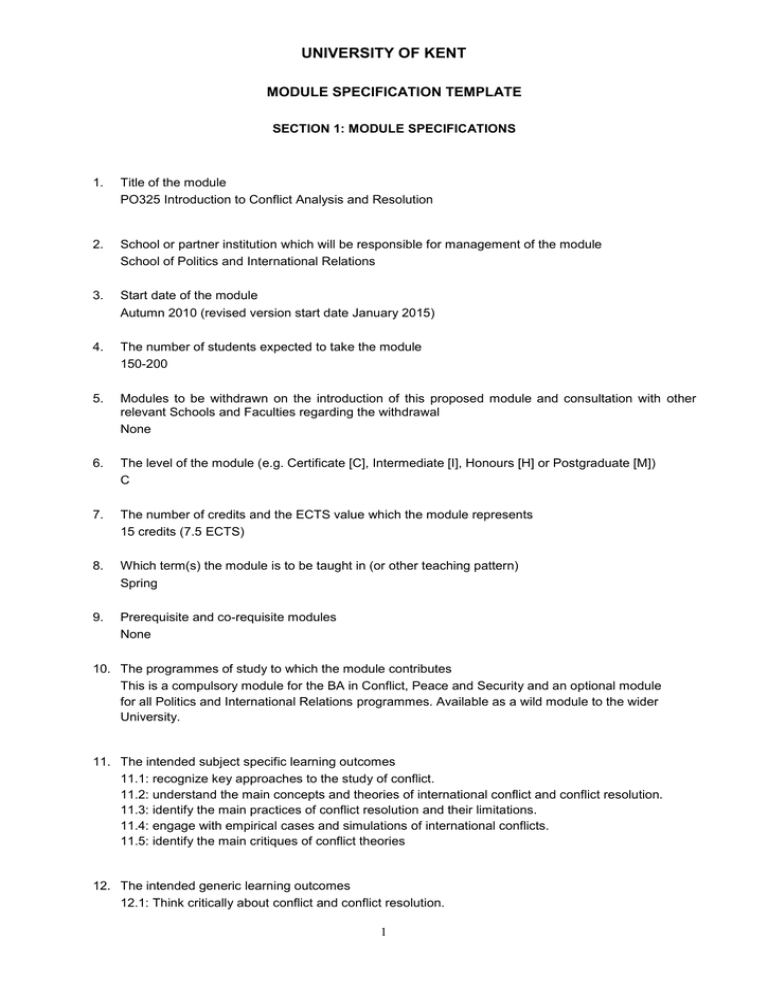
UNIVERSITY OF KENT MODULE SPECIFICATION TEMPLATE SECTION 1: MODULE SPECIFICATIONS 1. Title of the module PO325 Introduction to Conflict Analysis and Resolution 2. School or partner institution which will be responsible for management of the module School of Politics and International Relations 3. Start date of the module Autumn 2010 (revised version start date January 2015) 4. The number of students expected to take the module 150-200 5. Modules to be withdrawn on the introduction of this proposed module and consultation with other relevant Schools and Faculties regarding the withdrawal None 6. The level of the module (e.g. Certificate [C], Intermediate [I], Honours [H] or Postgraduate [M]) C 7. The number of credits and the ECTS value which the module represents 15 credits (7.5 ECTS) 8. Which term(s) the module is to be taught in (or other teaching pattern) Spring 9. Prerequisite and co-requisite modules None 10. The programmes of study to which the module contributes This is a compulsory module for the BA in Conflict, Peace and Security and an optional module for all Politics and International Relations programmes. Available as a wild module to the wider University. 11. The intended subject specific learning outcomes 11.1: recognize key approaches to the study of conflict. 11.2: understand the main concepts and theories of international conflict and conflict resolution. 11.3: identify the main practices of conflict resolution and their limitations. 11.4: engage with empirical cases and simulations of international conflicts. 11.5: identify the main critiques of conflict theories 12. The intended generic learning outcomes 12.1: Think critically about conflict and conflict resolution. 1 UNIVERSITY OF KENT 12.2: Engage with theory to help conceptualise and understand key issues and empirical cases. 12.3: Understand and apply some basic conflict resolution skills (e.g. negotiation, mediation) 12.4: Be equipped to use a variety of tools effectively to conduct preparatory research for essays and seminars 12.5: Engage in some independent research and learning demonstrating initiative, selforganisation and time-management 13. A synopsis of the curriculum The module is designed to introduce students to the principle approaches to conflict and conflict resolution. Starting with a discussion of the pervasiveness of conflict in human existence, the module will engage with key question of “what is conflict?” Students will be introduced to conflict management and conflict resolution approaches before engaging with key conflict resolution processes such as negotiation and mediation. The module will rely on case studies and simulations to help students engage directly and better grasp the different theoretical approaches. Case studies will include an in-depth analysis of the Oslo process and a discussion of the specific difficulties linked to negotiations with “terrorists.” The students will emerge from the module with knowledge of the central paradigms and concepts of conflict analysis and resolution, and with an initial set of skills (negotiation and mediation) which can be used to further understand international politics but also in their personal engagement with others. 14. Indicative Reading List Ramsbottam, O. Miall, H. and T. Woodhouse (2011). Contemporary Conflict Resolution: The Prevention, Management and Transformation of Deadly Conflicts. Cambridge: Polity. Azar, E. (1990) The Management of Protracted Social Conflict: Theory and Cases. Dartmouth: Aldershot. Bercovitch, J. and R. Jackson (2009). Conflict Resolution in the 21st century: Principles, Methods, and Approaches. Ann Arbor: University of Michigan Press. Burton, J. and Sandole, D. (1986). “Generic Theory: The Basis of Conflict Resolution”, Negotiation Journal. 2(4) 333-44. Fisher, R. and Ury, W. (1991). Getting to Yes, New York: Penguin. Hopmann, P. T. (2001). “Bargaining and Problem Solving: Two Perspectives on International Negotiation” in Crocker, C. A., Hampson, F. O. and Aall, P. (eds) Turbulent Peace. Washington: USIP (445-468). Toros, H. (2008) “‘We don’t talk to terrorists!’: Legitimacy and Complexity in Terrorist Conflicts,” Security Dialogue. 39(4): 407-426. 15. Learning and Teaching Methods, including the nature and number of contact hours and the total study hours which will be expected of students, and how these relate to achievement of the intended learning outcomes Lectures/seminars: Schedule: 22 hours; 1 hour lecture, 1 hour seminar per week for 11 weeks Learning Outcomes: Lectures will introduce the major theories and approaches to conflict and conflict resolution, illustrated through key case studies, as well as covering some of the commentary and criticism of the key theories and concepts (11.1-5; 12.1-4). Seminars will on examine the topics introduced in the lectures and the independent reading that students undertake. Several seminars will involve simulations of negotiation and mediation. Students will be encouraged to gain a synoptic understanding of the module by linking lectures, independent reading, seminars and simulations, having the opportunity in classes to discuss concepts and theories, develop and defend complex arguments, while reflecting on their participation (11.1-5; 12.1-4). 2 UNIVERSITY OF KENT Achievement of Learning Outcomes: Lectures: Learning outcomes will be achieved through the oral and visual presentation of lecture material covering the relevant topics. Students will be introduced to the key debates around the nature of conflict and conflict resolution also through case studies. Seminars/Simulations: Learning outcomes will be achieved through discussion with other students in which they will develop their skills through analysis, cooperation and intellectual confrontation. Class discussions will also help students develop their understanding of the context of particular ideas and their applicability to contemporary conflicts. Simulations will help students understand and develop specific conflict resolution skills. Independent study Schedule: Students are expected to devote 128 hours to independent study. This study will involve students reading the recommended texts for each seminar, assimilating and reflecting on material from lectures, preparing for seminars and researching and carrying out coursework assignments. Learning Outcomes: 11.1-5, 12.1-5. Achievement of Learning Outcomes: These outcomes will be achieved through students’ own reading, research and preparation. 16. Assessment methods and how these relate to testing achievement of the intended learning outcomes Formative assessment of students will be given throughout the module in the form of oral feedback on class discussions plus written and oral feedback on coursework. Summative assessment will proceed as follows: Type of assessment Task Learning outcomes assessed Weight towards final mark Conflict Report Conflict report of 2,000 words examining a conflict through realist and conflict resolution lenses. 11.1-5 40 % Four reading quizzes covering all the main theories and approaches to conflict resolution. Each quiz contributes 5 percentages points to the aggregate mark. 11.1-5 Two essay questions (equally weighted) to be chosen from a list of eight covering all the main theories of conflict and approaches to conflict resolution. 11.1-5 Reading assignments Exam 12.1-5 20% 12.1-2, 5 40% 12.1-2 17. Implications for learning resources, including staff, library, IT and space No additional resources required. 18. The School recognises and has embedded the expectations of current disability equality legislation, and supports students with a declared disability or special educational need in its teaching. Within 3 UNIVERSITY OF KENT this module we will make reasonable adjustments wherever necessary, including additional or substitute materials, teaching modes or assessment methods for students who have declared and discussed their learning support needs. Arrangements for students with declared disabilities will be made on an individual basis, in consultation with the University’s disability/dyslexia support service, and specialist support will be provided where needed. You may need to write a specific statement for the particular module. The format can be taken from above. Be aware of the particular demands of the individual module, e.g. field trips or practical work will have specific requirements. The statement must relate to arrangements necessary to ensure the student has the opportunity to achieve the learning outcomes of the module. 19. Campus where module will be delivered: Canterbury 4 UNIVERSITY OF KENT SECTION 2: MODULE IS PART OF A PROGRAMME OF STUDY IN A UNIVERSITY SCHOOL Statement by the School Director of Learning and Teaching/School Director of Graduate Studies (as appropriate): "I confirm I have been consulted on the above module proposal and have given advice on the correct procedures and required content of module proposals" ................................................................ .............................................. Director of Learning and Teaching/Director of Graduate Studies (delete as applicable) Date ………………………………………………… Print Name Statement by the Head of School: "I confirm that the School has approved the introduction of the module and, where the module is proposed by School staff, will be responsible for its resourcing" ................................................................. .............................................. Head of School Date ……………………………………………………. Print Name SECTION 3: MODULE IS PART OF A PROGRAMME IN A PARTNER COLLEGE OR VALIDATED INSTITUTION (Where the module is proposed by a Partner College/Validated Institution) Statement by the Nominated Officer of the College/Validated Institution (delete as applicable): "I confirm that the College/Validated Institution (delete as applicable) has approved the introduction of the module and will be responsible for its resourcing" ................................................................. .............................................. Nominated Responsible Officer of Partner College/Validated Institution Date …………………………………………………. Print Name ………………………………………………….. Post …………………………………………. Partner College/Validated Institution Module Specification Template Last updated October 2012 5
